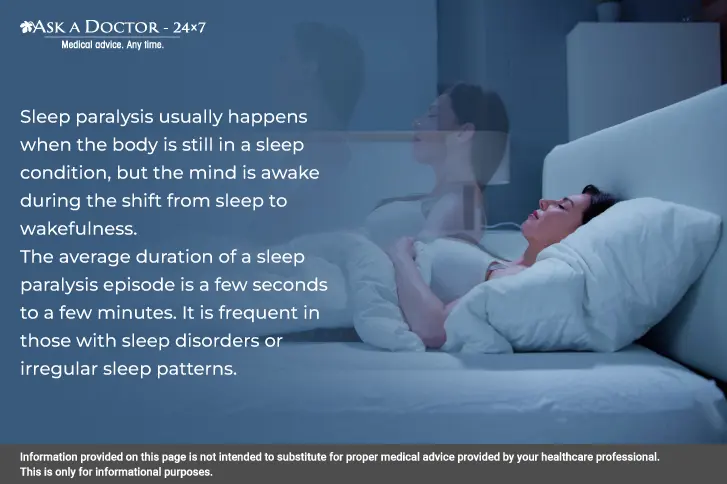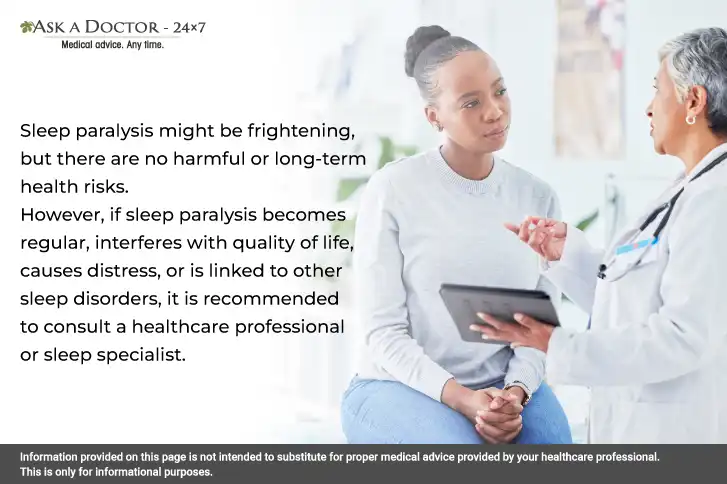Sleep Paralysis Is Getting Common: Know The Causes And Prevention
Do you know that humans spend about one-third of their lives asleep? Getting enough quality sleep and at the right times is as essential to survival as food and water. Sleep paralysis is a state in which you are awake but unable to move or speak. It can be frightening, but it is harmless, and most individuals experience it only once or twice in their lifetime. It is frequently caused mostly due to sleep disturbances, such as stress, irregular schedules, or sleep deprivation. It is found that isolated episodes are typically benign. However, if sleep paralysis becomes regular or negatively impacts quality of life, it's critical to address the underlying problems.
It is true that following a sleep paralysis episode, you could experience fear and anxiety. You could be concerned about what transpired and whether it will recur once you are free to move again. In this blog, find out more about sleep paralysis's causes, signs, and remedies.
What is Sleep Paralysis?
Sleep paralysis occurs when there is a disturbance in the regular sleep-wake cycle in which the brain wakes up, but the body stays in a calm, dream-like state of paralysis of the muscles. This typically happens when a person enters or exits rapid eye movement (REM) sleep. REM sleep occurs about 90 minutes after falling asleep. This disturbance may be more likely due to several circumstances.
What Happens During Sleep paralysis

Understanding what happens during sleep paralysis can help individuals cope with and manage this condition:
1. Muscle paralysis: To keep people from acting out their dreams and maybe hurting themselves, the brain transmits signals to stop muscle action during REM sleep during a regular sleep cycle. But in sleep paralysis, the paralysis of the muscles continues even as the person starts to wake up, resulting in the sensation that they are immobile.
2. Awareness of consciousness: People who suffer from sleep paralysis are frequently completely alert and aware of their surroundings, even though they are unable to move or talk. The experience's related terror or panic may worsen as a result of this increased awareness. Furthermore, being immobile can make one feel vulnerable or powerless.
3. Delusions: It is like a vivid hallucination, which might differ greatly from person to person, are frequently a part of sleep paralysis. These hallucinations could be tactile, aural, or visual. Seeing shadowy creatures or feeling as though you are being held down or touched are common examples of hallucinations. The brain stays partially in the dream state while the person is awake, which causes these hallucinations.
4. Sensory disturbance: During sleep paralysis, people may also have sensory abnormalities in addition to hallucinations. These can include breathing difficulties or pressure on the chest, which can exacerbate the sense of suffocation or impending doom that people with sleep paralysis frequently describe.
Causes of Sleep Paralysis
Common causes of sleep paralysis are:
- Lack of sleep or insomnia
- Irregular sleep schedules (due to shift employment or jet lag)
- Mental health issues such as post-traumatic stress disorder (PTSD) or generalized anxiety disorder
- Certain drugs, stimulants, or alcohol
- Sleep disorders like narcolepsy (the brain is unable to regulate sleeping and waking patterns) and obstructive sleep apnea
- Family history of sleep paralysis
Symptoms of Sleep Paralysis
You may experience the following symptoms either right before bed or shortly after waking up during a sleep paralysis episode:
- Inability to move your legs or arms
- Unable to speak
- Suffocation-like pressure on the chest or a sense of detachment from the body
- Drowsiness during the day
- Hallucinations, including feeling as though someone is in the room
How To Prevent Sleep Paralysis

By altering your sleeping patterns, you might be able to avoid sleep paralysis. These include:
- Improve sleep environment and habits. Aim for 7 to 9 hours of uninterrupted sleep each day. Prefer a room that is quiet, dark, and cool to simulate good sleep.
- Follow a consistent sleep schedule. Try going to bed roughly at the same time each night and getting up at the same time each morning.
- Avoid the use of electronic devices, such as phones and tablets, before bed.
- Exercise frequently, but avoid doing so right before bed.
- Incorporate stress-relief techniques such as yoga, mindfulness meditation, and progressive muscle relaxation.
- Avoid eating a large meal, consuming caffeine or alcohol, and smoking right before bed.
- Avoid sleeping on your back, as this increases the risk of developing sleep paralysis.
Conclusion
Persistent sleep paralysis can be unnerving, particularly if it starts to interfere with everyday activities or rest. Professional assistance becomes crucial when episodes increase in frequency or are accompanied by symptoms of an underlying sleep or mental health issue. Hence, understanding the causes, symptoms, and preventative techniques of episodes can help people manage or lessen them.
Your healthcare professional can assist in proposing situation-appropriate treatment solutions by examining the potential reasons. If managing your sleep problems is getting harder, it might be time to schedule an appointment with a neurologist.
If you have any questions related to sleep paralysis, you can Ask a Sleep Specialist at Ask a Doctor - 24x7. Also, you can consult our neurologist for the same.
Recently Answered Questions Related to Sleep Paralysis
- Reasons, Causes And Prevention Of Sleep Paralysis
- Can Strocit Tablet Cause Sleeplessness?
- How To Take Advil To Get Good Sleep?
- Can Sleep Paralysis Cause Sweating, Rapid Heartbeat And Tremors? Is It Related To Fatty Liver And High Uric Acid Level?
- What Causes Numbness In The Body, Leg Weakness, And Sudden Spontaneous Fall While Walking?
- Is It To Be Concerned If Sleep Paralysis Occur Frequently?
- What Causes Sleep Paralysis?
- Suggest Treatment For Giddiness, Severe Headache, Panic Attacks, Depression And Lack Of Sleep
Disclaimer: Information provided on this page is not intended to substitute for proper medical advice provided by your healthcare professional. This is only for informational purposes.
Ask a Specialist
Recent Questions


